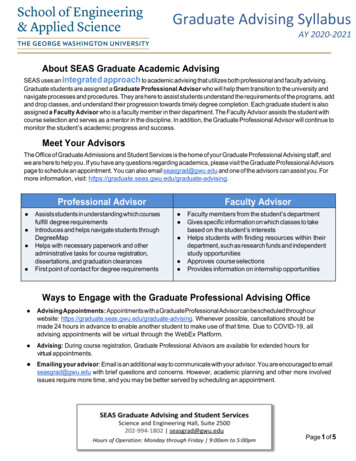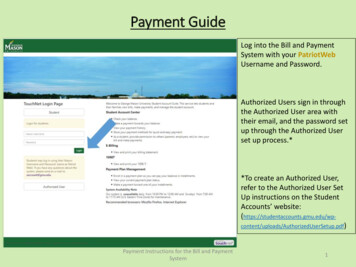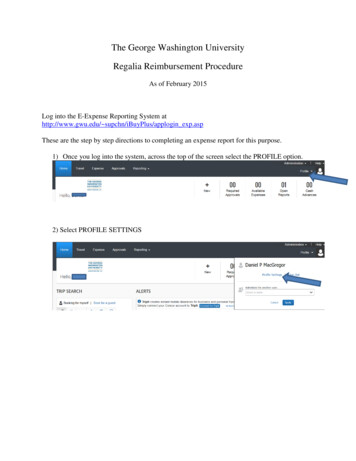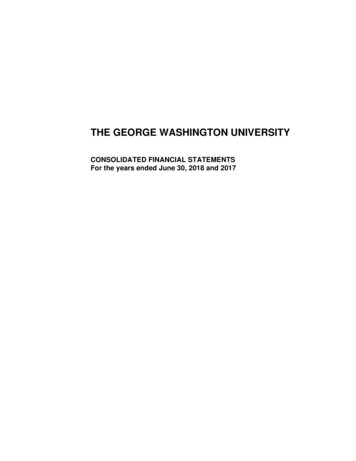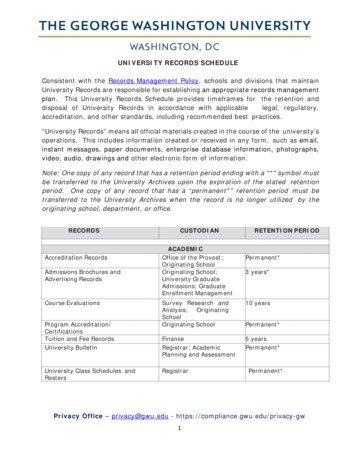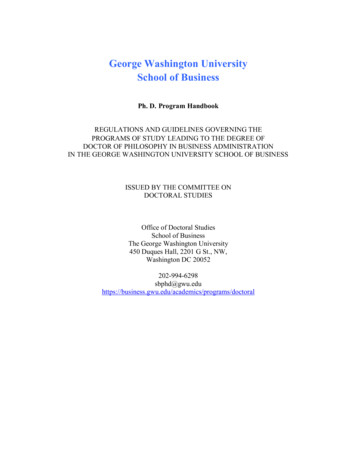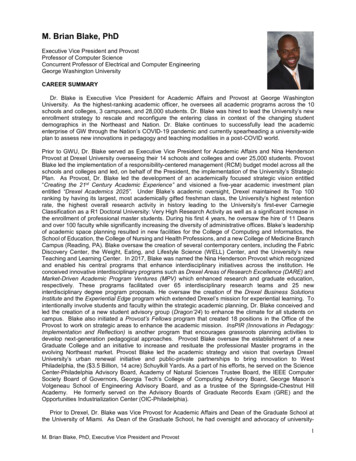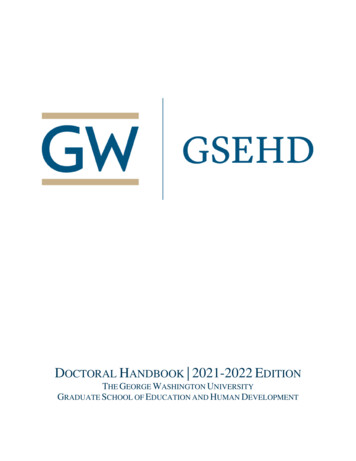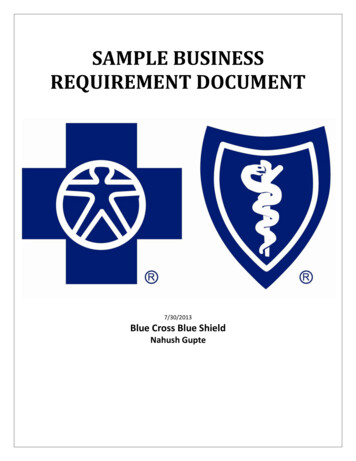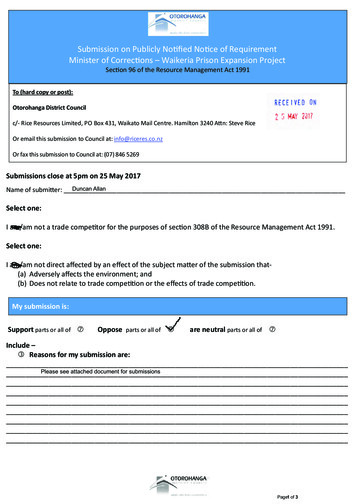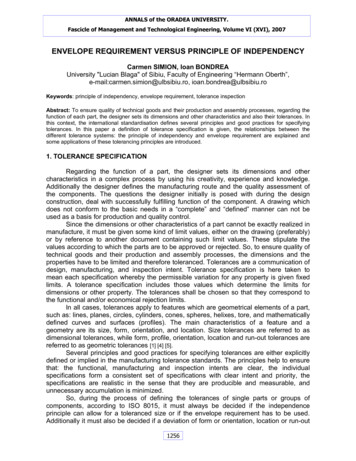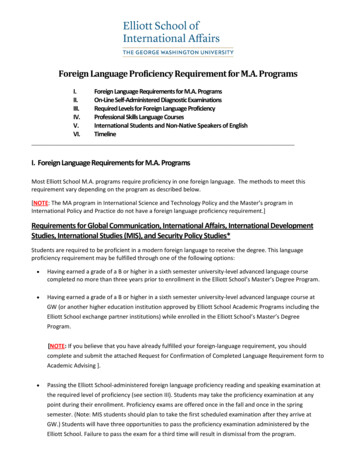
Transcription
Foreign Language Proficiency Requirement for M.A. ProgramsI.Foreign Language Requirements for M.A. ProgramsII.On-Line Self-Administered Diagnostic ExaminationsIII.Required Levels for Foreign Language ProficiencyIV.Professional Skills Language CoursesV.International Students and Non-Native Speakers of EnglishVI.TimelineI. Foreign Language Requirements for M.A. ProgramsMost Elliott School M.A. programs require proficiency in one foreign language. The methods to meet thisrequirement vary depending on the program as described below.[NOTE: The MA program in International Science and Technology Policy and the Master’s program inInternational Policy and Practice do not have a foreign language proficiency requirement.]Requirements for Global Communication, International Affairs, International DevelopmentStudies, International Studies (MIS), and Security Policy Studies*Students are required to be proficient in a modern foreign language to receive the degree. This languageproficiency requirement may be fulfilled through one of the following options: Having earned a grade of a B or higher in a sixth semester university-level advanced language coursecompleted no more than three years prior to enrollment in the Elliott School’s Master’s Degree Program. Having earned a grade of a B or higher in a sixth semester university-level advanced language course atGW (or another higher education institution approved by Elliott School Academic Programs including theElliott School exchange partner institutions) while enrolled in the Elliott School’s Master’s DegreeProgram.[NOTE: If you believe that you have already fulfilled your foreign-language requirement, you shouldcomplete and submit the attached Request for Confirmation of Completed Language Requirement form toAcademic Advising ]. Passing the Elliott School-administered foreign language proficiency reading and speaking examination atthe required level of proficiency (see section III). Students may take the proficiency examination at anypoint during their enrollment. Proficiency exams are offered once in the fall and once in the springsemester. (Note: MIS students should plan to take the first scheduled examination after they arrive atGW.) Students will have three opportunities to pass the proficiency examination administered by theElliott School. Failure to pass the exam for a third time will result in dismissal from the program.
2 Achieving the required proficiency level in a reading and speaking examination administered by an ElliottSchool-approved foreign-language assessment institution at the student’s expense while enrolled in theElliott School’s Master’s Degree Program. Demonstration of the required foreign language proficiency level in a foreign language professional skillscourse offered through the Elliott School. The instructor will test the student during this foreign languageskills course to determine if the required proficiency level has been achieved. (see section IV)*Security Policy Studies MA students may take the Statistics Option in lieu of foreign languageproficiency. This option may be fulfilled by demonstrating proficiency, by a grade of B or better, in one ofthe following graduate-level statistics courses: IAFF 6501 (Quantitative Analysis for International Affairs Practitioners) IAFF 6198 Advanced Quantitative Analysis (preferred course for students with advancedstatistics backgrounds)With prior approval of the Program Director, other statistics courses may be used to satisfy thisoption.Requirements for Asian Studies, European and Eurasian Studies, Latin American andHemispheric Studies, and Middle East Studies:Students in the MA regional studies programs are required to be proficient in a modern foreign language that isused in their region of study (consult each academic program to determine which foreign languages qualify) toreceive the degree. They must fulfill this foreign-language requirement by passing both the reading and thespeaking proficiency examinations administered by the Elliott School at a level required by the academicprogram. Advanced-level language coursework during or prior to enrollment at GW cannot substitute. Foreignlanguage proficiency examinations will be offered during the fall and spring semesters. Students may take theexamination at any point during their enrollment and will have three opportunities to pass the proficiencyexamination administered by the Elliott School. Failure to pass the exam for a third time will result in dismissalfrom the program.[NOTE: When a student’s native language is not English, and is not a language used in their region of study (for examplea student who is a native speaker of Chinese in the Middle East Studies program), that student must still demonstrateproficiency in a modern language used in their region of study by passing the Elliott School language proficiencyexamination.]Requirements for International Trade and Investment Policy (ITIP):Students are required to be proficient in a modern foreign language to receive the degree. This languageproficiency requirement may be fulfilled through one of the following options:
3 Having earned a grade of a B or higher in a fourth semester university-level advanced language coursecompleted no more than three years prior to enrollment in the Elliott School’s Master’s DegreeProgram. Having earned a grade of a B or higher in a fourth semester university-level advanced language course(or another higher education institution approved by Elliott School Academic Programs including theElliott School exchange partner institutions) while enrolled in the Elliott School’s Master’s DegreeProgram.[NOTE: If you believe that you have already fulfilled your foreign-language requirement, you shouldcomplete and submit the Request for Confirmation of Completed Language Requirement form toAcademic Advising. Passing the Elliott School-administered foreign language proficiency reading and speaking examinationat the currently required level of proficiency. Students may take the proficiency examination at anypoint during their enrollment. Proficiency exams are offered once in the fall and once in the springsemester. (Note: MIS students should plan to take the first scheduled examination after they arrive atGW.) Students will have three opportunities to pass the proficiency examination administered by theElliott School. Failure to pass the exam for a third time will result in dismissal from the program. Achieving the required proficiency level in a reading and speaking examination administered by anElliott School-approved foreign-language assessment institution at the student’s expense while enrolledin the Elliott School’s Master’s Degree Program. Demonstration of the required foreign language proficiency level in a foreign language professionalskills course offered through the Elliott School. The instructor will test the student during this foreignlanguage skills course to determine if the required proficiency level has been achieved. (see section IV)II. On-Line Self-Administered Diagnostic ExaminationsStudents who are in M.A. degree programs with a foreign-language proficiency requirement and who did notmeet this requirement with university-level course work prior to enrollment must take an on-line selfadministered diagnostic examination in the foreign language that they would like to use to demonstrate therequired proficiency. This diagnostic examination must be taken before the end of the first semester afterenrollment; and students will not be able to register to take the Elliott School foreign language proficiencyexamination without first taking the on-line diagnostic examination. Students who wish to enroll in an ElliottSchool 1-credit professional skills language course must also take the relevant diagnostic examination beforeregistration and receive a score in at least the “intermediate-level” range.
4The Elliott School currently offers on-line diagnostic examinations in the following languages: Arabic, Chinese,French, German, Italian, Japanese, Korean, Portuguese, Russian, and Spanish. Students are exempt from thediagnostic examination requirement if they intend to fulfill the language requirement in a language that theElliott School does not offer a diagnostic test.Students may take the on-line diagnostic examination in more than one language. If a student would like to retake the diagnostic examination in the same language, one should not do so unless an interval of at least twomonths has passed. These diagnostic examinations provide only a rough estimate of one’s language proficiency.Therefore, a certain score is no guarantee that one will pass the proctored language proficiency test at therequired level.Students may access the diagnostic examinations through the following links:Arabic Diagnostic etesting/arabicdiagnosticChinese Diagnostic etesting/chinesediagnosticFrench Diagnostic etesting/frenchdiagnosticGerman Diagnostic etesting/germandiagnosticItalian Diagnostic etesting/italiandiagnosticJapanese Diagnostic etesting/japanesediagnosticKorean Diagnostic etesting/koreandiagnosticPortuguese Diagnostic Exam (students should also take the Portuguese oral getesting/portuguesediagnosticPortuguese Oral etesting/oralRussian Diagnostic etesting/russiandiagnositcSpanish Diagnostic etesting/spanishdiagnostic
III. Required Levels for Foreign Language ProficiencyThe following are the required proficiency levels for languages offered on a regular basis at the GeorgeWashington University:LanguageReadingSpeakingArabicAdvanced (MES students)Intermediate HighIntermediate Low (ITIP only)Advanced (MES students)Intermediate HighIntermediate Low (ITIP only)ChineseIntermediate HighIntermediate Low (ITIP only)Intermediate HighIntermediate Low (ITIP only)FrenchAdvancedIntermediate Low (ITIP only)Intermediate HighIntermediate Low (ITIP only)GermanAdvancedIntermediate Low (ITIP only)Intermediate HighIntermediate Low (ITIP only)HebrewIntermediate HighIntermediate Low (ITIP only)Intermediate HighIntermediate Low (ITIP only)ItalianAdvancedIntermediate Low (ITIP only)Intermediate HighIntermediate Low (ITIP only)JapaneseIntermediate HighIntermediate Low (ITIP only)Intermediate HighIntermediate Low (ITIP only)KoreanIntermediate HighIntermediate Low (ITIP only)Intermediate HighIntermediate Low (ITIP only)PersianAdvanced (MES students)Intermediate HighAdvanced (MES students)Intermediate HighPortugueseAdvancedIntermediate Low (ITIP only)Intermediate HighIntermediate Low (ITIP only)RussianAdvanced (EES students)Intermediate HighIntermediate Low (ITIP only)Intermediate HighIntermediate Low (ITIP only)SpanishAdvancedIntermediate Low (ITIP only)Intermediate HighIntermediate Low (ITIP only)5
6The following are descriptions of the required proficiency levels:Reading --- Intermediate LowThe student can understand some facts and main ideas in simple connected texts dealing with basicpersonal and social needs. These texts would have a clear and simple structure and provide informationwith which the student is familiar or is required to make only minimal suppositions. The student maymake occasional errors in understanding.Reading — Intermediate HighThe student can fully understand simple connected texts dealing with basic personal and social needs;comprehend main ideas and information in texts at the next higher level featuring description andnarration. Structural complexity may interfere with comprehension; e.g., basic grammatical relationsmay be misinterpreted and temporal references may rely primarily on lexical items. Some difficulty withthe cohesive factors in discourse may be evident, such as matching pronouns with referents. While textsdo not differ significantly from those at the Advanced level, comprehension is less consistent. Thestudent at this level may have to read material several times for full understanding.Reading — AdvancedThe student can easily read and understand several paragraphs if the text has a clear underlyingstructure and familiar sentence patterns. The student comprehends the main ideas and facts but missessome details. Comprehension arises from situational and subject matter knowledge as well as increasingcontrol of the language. Texts at this level include descriptions and narrations such as short stories,news items, bibliographical information, social notices, personal correspondence, business letters andsimple technical material written for the general reader.Speaking --- Intermediate LowThe student can handle a limited number of communicative tasks and social situations successfully, askand answer questions, initiate and respond to simple statements, and engage in face-to-faceconversation. The conversation, however, will contain frequent linguistic errors and will be veryrestricted in manner and scope. Vocabulary will be sufficient to discuss the most elementary needs, butthere will be frequent misunderstandings. The Intermediate-Low speaker is generally understood bysympathetic interlocutors.Speaking — Intermediate HighThe student can handle most communicative tasks and social situations successfully and can initiate andsustain a general conversation with strategies appropriate to diverse circumstances and topics, buterrors are evident. Limited vocabulary causes some hesitation and may produce unexpectedcircumlocution. However, there is emerging evidence of connected discourse (i.e., the ability to speak inwhole paragraphs), particularly for simple narration and/or description. The Intermediate-High speakeris generally understood by interlocutors, who are unaccustomed to dealing with speakers at this level,but repetition may still be required.
Speaking — Advanced7The student at the Advanced level participates in informal conversations related to school, leisure, andhome life, and at times in formal situations in these environments. Advanced speakers can carry on alengthy conversation in all tense forms although aspect may be occasionally lacking. During narrationsor extended speech they are able link sentences together with smooth conjunctions. Some literaltranslations and false cognates still appear, showing the speakers’ reliance on native structure. Theconversation flow of an Advanced speaker remains substantive with only occasional hesitation,grammatical errors, self-correction, and sometimes generic vocabulary. They are understood by nativespeakers who do not have the habit of understanding non-natives, or are able to make themselvesunderstood with repetition or rephrasing.IV. One-Credit Professional Skills Language CoursesThe Elliott School currently offers one-credit professional skills language courses (IAFF 6504) in the followinglanguages: Arabic, Chinese, French, Portuguese, Russian, and Spanish. Students with intermediate-levelproficiency may take these courses to improve their language ability and to prepare for the language proficiencyexamination. In order to enroll in these courses, students must first take the online diagnostic test (see sectionII) in the corresponding language and achieve a score in at least the intermediate-level range. For non-regionalstudies M.A. programs, students may fulfill their language requirement by demonstrating the required level oflanguage proficiency in the context of this one-credit course through an evaluation administered by theinstructor. Students in the M.A. regional studies program may use this one-credit course to improve theirlanguage skills, but they must still take the Elliott School language proficiency test.V. International Students and Non-Native Speakers of EnglishEnglish for Academic Purposes (EAP) Placement CourseAll students whose native language is not English or who are not citizens of countries where Englishis the official language are required to take an EAP course before classes begin if they scored below 620on the paper-based, 260 on the computer-based, or 105 on the internet TOEFL exam. The courses aredesigned to facilitate the successful completion of the degree program.Any of the 3-Credit EAP graded courses can substitute for a maximum of 1-credit hour of the ElliottSchools professional skills course requirement and will count toward the students degree as long as thestudent’s Elliott School degree program allows professional skills courses. Other EAP course credits andEAP courses taken by students in degree programs that do not allow professional skills courses will notcount toward the degree.
8VI. Timeline On-line self-administered diagnostic examination (must be taken by the end of the first semesterand before registering for the language proficiency test or the 1-credit professional skills languagecourses). English for Academic Purposes (EAP) Placement Examination (late August) Pre-registration for the Fall semester foreign language proficiency tests (October) Fall semester foreign language proficiency tests (November) Pre-registration for the Spring semester foreign language proficiency tests (February) Spring semester foreign language proficiency tests (March-April)[NOTE: Currently enrolled students will receive via-email the pre-registration announcement for theforeign language proficiency tests from the Office of Academic Advising and Student Services.]
GW (or another higher education institution approved by Elliott School Academic Programs including the Elliott School exchange partner institutions) while enrolled in the Elliott School’s Master’s Degree Program
